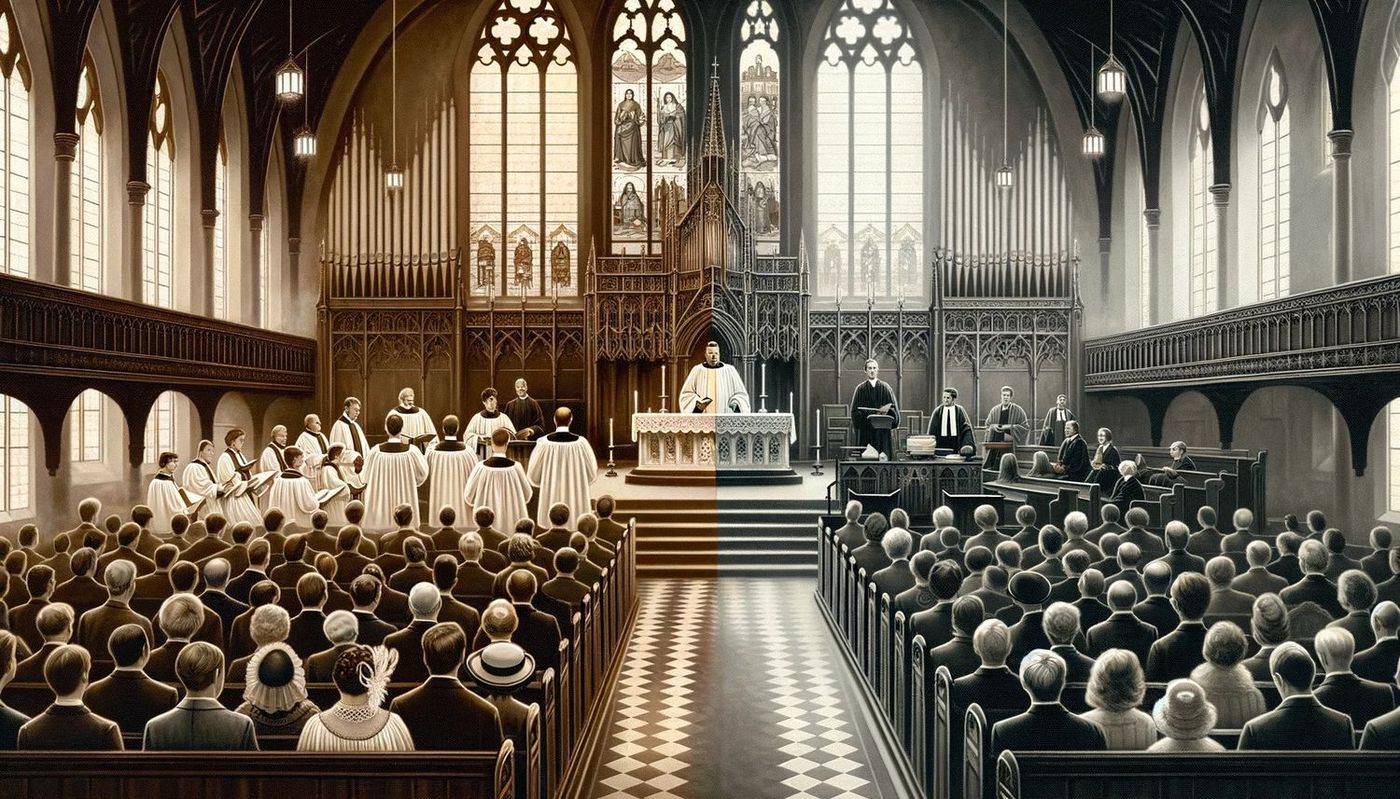Home>Theology and Spirituality>What Is The Difference Between A Baptist And A Christian Church


Theology and Spirituality
What Is The Difference Between A Baptist And A Christian Church
Published: February 20, 2024
Jason DeRose, Managing Editor at Christian.net, uses his expertise in religion and journalism to deepen understanding of faith's societal impacts. His editorial leadership, coupled with a strong academic background, enriches the platform’s diverse content, earning him recognition in both journalism and religious circles.
Discover the distinctions between Baptist and Christian churches, exploring their theological and spiritual differences. Learn about their beliefs and practices.
(Many of the links in this article redirect to a specific reviewed product. Your purchase of these products through affiliate links helps to generate commission for Christian.net, at no extra cost. Learn more)
Table of Contents
Introduction
When exploring the landscape of Christianity, one may encounter various denominations and traditions that contribute to the rich tapestry of the faith. Among these, two prominent branches are Baptist and Christian churches. While both share a foundation in the teachings of Jesus Christ, they differ in certain theological perspectives, worship styles, and organizational structures. Understanding the distinctions between these two expressions of faith can provide valuable insights into the diverse manifestations of Christianity.
In this article, we will delve into the beliefs, practices, and traditions that distinguish Baptist churches from Christian churches. By examining their theological foundations, worship styles, leadership structures, and sacramental practices, we aim to shed light on the nuanced differences that shape the identities of these two branches of Christianity. Through this exploration, readers will gain a deeper understanding of the multifaceted nature of Christian faith and the diverse ways in which it is expressed within different denominational contexts.
As we embark on this journey of discovery, it is important to approach the topic with an open mind and a spirit of curiosity. While differences exist between Baptist and Christian churches, it is essential to recognize the shared commitment to following the teachings of Jesus Christ and the common desire to live out the principles of love, compassion, and faith. By embracing a spirit of understanding and respect, we can appreciate the beauty of diversity within the Christian faith and celebrate the various ways in which individuals and communities express their devotion to God.
Throughout this exploration, we invite you to consider the unique characteristics of Baptist and Christian churches, recognizing that each tradition contributes to the rich mosaic of Christian belief and practice. By gaining insight into the distinct elements that define these two branches of Christianity, we can cultivate a deeper appreciation for the multifaceted nature of the faith and the myriad ways in which it enriches the lives of believers around the world.
Beliefs and Practices of Baptist Churches
Baptist churches are rooted in a distinct set of beliefs and practices that shape their identity within the broader Christian tradition. Central to Baptist theology is the principle of believer's baptism, which emphasizes the symbolic significance of baptism as a public declaration of faith by individuals who have personally professed their belief in Jesus Christ. Unlike some Christian denominations that practice infant baptism, Baptists maintain that baptism should be reserved for those who have consciously chosen to follow Christ, reflecting their commitment to the autonomy of the individual believer.
In addition to their emphasis on believer's baptism, Baptist churches prioritize the authority of Scripture, viewing the Bible as the ultimate source of divine revelation and guidance for faith and practice. This commitment to biblical authority is reflected in the preaching and teaching within Baptist congregations, where the study and interpretation of Scripture hold significant importance.
Furthermore, Baptist churches adhere to the principle of congregational governance, wherein each local church operates autonomously, free from external hierarchical control. This congregational polity empowers members of the church to participate in decision-making processes, including the selection of leaders and the establishment of doctrinal beliefs and practices. As a result, Baptist churches often exhibit a strong sense of community involvement and democratic leadership structures, with an emphasis on the priesthood of all believers.
In terms of worship practices, Baptist churches typically prioritize congregational singing, heartfelt prayer, and expository preaching, wherein the systematic exposition of biblical passages forms the core of sermons. This emphasis on the direct communication of biblical truths aligns with the Baptist commitment to the authority of Scripture and the importance of personal faith expression within the context of communal worship.
Additionally, Baptists hold distinctive views on the nature of salvation, emphasizing the concept of "soul competency," which asserts that individuals are personally responsible for their relationship with God and their spiritual journey. This belief underscores the autonomy of the individual believer and the personal accountability in matters of faith and salvation.
Overall, the beliefs and practices of Baptist churches reflect a commitment to individual autonomy, congregational governance, biblical authority, and believer's baptism, shaping a distinct identity within the diverse tapestry of Christian traditions. These foundational principles guide the worship, community life, and theological outlook of Baptist congregations, contributing to their unique place within the broader landscape of Christianity.
Beliefs and Practices of Christian Churches
Christian churches encompass a wide array of denominations, each with its own unique set of beliefs and practices that contribute to the rich diversity of the Christian faith. While there is no singular set of doctrines that universally define all Christian churches, there are certain core beliefs and practices that are commonly shared across various denominational lines.
At the heart of Christian belief is the affirmation of the triune nature of God, acknowledging the Father, Son, and Holy Spirit as distinct yet unified in the divine essence. This foundational doctrine, known as the Trinity, serves as a central tenet of Christian faith, shaping the understanding of God's nature and the relationship between the divine persons.
Furthermore, Christian churches uphold the authority of the Bible as the inspired and authoritative Word of God, serving as the primary source of divine revelation and guidance for matters of faith and practice. The study, interpretation, and proclamation of Scripture hold significant importance within Christian congregations, reflecting a commitment to engaging with the teachings and narratives contained within the biblical text.
In the realm of worship, Christian churches exhibit a diverse range of practices, encompassing liturgical traditions, contemporary expressions, and everything in between. Some Christian denominations follow formal liturgical structures, incorporating sacraments such as the Eucharist (also known as Communion or the Lord's Supper) and observing liturgical seasons such as Advent, Lent, and Easter. Others emphasize vibrant praise and worship, incorporating music, prayer, and preaching into their worship services. The diversity of worship styles within Christian churches reflects the multifaceted ways in which believers seek to honor and connect with God in communal settings.
In addition to these core beliefs and worship practices, Christian churches often emphasize the importance of community, outreach, and social justice. Many Christian denominations are actively involved in charitable initiatives, community service projects, and advocacy efforts aimed at addressing social issues and promoting compassion and justice in the world. This commitment to social engagement reflects the Christian belief in loving one's neighbor and working towards the well-being of all members of society.
Overall, the beliefs and practices of Christian churches encompass a broad spectrum of theological perspectives, worship styles, and social commitments, reflecting the diverse expressions of faith within the global Christian community. While differences exist among various denominations, the shared commitment to following the teachings of Jesus Christ and embodying the principles of love, grace, and compassion unites Christian churches in their collective witness to the transformative power of the Christian faith.
Differences in Worship Styles
Worship styles play a significant role in shaping the communal expressions of faith within Baptist and Christian churches, reflecting the diverse approaches to honoring and connecting with the divine. While both traditions share a common commitment to worship as a central aspect of spiritual life, they often exhibit distinct styles and practices that contribute to the unique character of their worship experiences.
In many Baptist churches, worship services are characterized by a focus on congregational singing, heartfelt prayer, and expository preaching. The congregational singing of hymns and spiritual songs holds a prominent place in Baptist worship, providing an opportunity for the community to unite in musical praise and adoration. This emphasis on congregational participation in musical worship reflects the Baptist belief in the priesthood of all believers and the communal expression of faith through music and song.
Additionally, heartfelt prayer serves as a foundational component of Baptist worship, allowing individuals to express their personal petitions, thanksgivings, and intercessions within the context of the gathered community. The practice of corporate prayer fosters a sense of unity and shared spiritual intimacy, as members join together in lifting their hearts and voices to God.
Expository preaching, characterized by the systematic exposition of biblical passages, occupies a central role in Baptist worship services. Through the careful examination and application of Scripture, preachers seek to communicate the truths and teachings contained within the Bible, emphasizing the importance of biblical instruction and spiritual edification within the faith community.
In contrast, Christian churches encompass a wide spectrum of worship styles, ranging from formal liturgical traditions to contemporary expressions of praise and worship. Some Christian denominations follow formal liturgical structures, incorporating sacraments such as the Eucharist and observing liturgical seasons, which provide a rhythmic framework for communal worship and spiritual reflection.
On the other hand, many Christian churches emphasize vibrant praise and worship, incorporating contemporary music, expressive forms of prayer, and dynamic preaching into their worship services. This style of worship often seeks to create a participatory and emotionally engaging environment, inviting worshippers to express their devotion and connect with the divine through diverse forms of artistic and spiritual expression.
The differences in worship styles between Baptist and Christian churches reflect the varied approaches to communal worship and spiritual expression within the broader Christian tradition. While Baptist worship often emphasizes congregational singing, heartfelt prayer, and expository preaching, Christian churches exhibit a diverse range of worship practices, encompassing both formal liturgical traditions and contemporary expressions of praise and worship. These distinct worship styles contribute to the rich tapestry of Christian worship, reflecting the multifaceted ways in which believers seek to honor and connect with God in communal settings.
Differences in Leadership Structure
The leadership structure within Baptist and Christian churches represents a significant point of divergence, reflecting distinct approaches to organizational governance and decision-making processes. In Baptist churches, the principle of congregational polity forms the foundation of leadership structure, emphasizing the autonomy of individual congregations and the active participation of church members in matters of governance and leadership selection. This congregational governance model grants each local church the authority to make independent decisions regarding its affairs, including the selection of pastors, church leaders, and the establishment of doctrinal beliefs and practices. As a result, Baptist churches often exhibit a democratic leadership structure, wherein the congregation plays a central role in the decision-making processes, reflecting the Baptist commitment to the priesthood of all believers and the autonomy of the local church.
In contrast, many Christian churches, particularly those within liturgical traditions such as Catholicism, Eastern Orthodoxy, and certain branches of Protestantism, operate under a hierarchical leadership structure characterized by the presence of ordained clergy, bishops, and ecclesiastical authorities. Within these hierarchical systems, authority and decision-making power are often vested in ordained clergy, who may be appointed or assigned to oversee specific congregations or regions within the church hierarchy. This hierarchical model emphasizes the role of ordained ministers and bishops in providing spiritual leadership, guidance, and pastoral care to the faithful, reflecting a structured approach to organizational governance and leadership accountability.
Furthermore, the differences in leadership structure extend to the process of leadership selection and ordination. In Baptist churches, the congregation typically plays a direct role in the selection and affirmation of pastors and church leaders, often through a process of congregational affirmation or voting. This participatory approach to leadership selection reflects the Baptist commitment to the autonomy of the local church and the active involvement of church members in shaping the direction and leadership of the congregation.
In contrast, within hierarchical Christian churches, the process of leadership selection and ordination often involves formal training, theological education, and the conferral of ordination by higher ecclesiastical authorities. Ordained clergy, including priests, deacons, and bishops, undergo a process of discernment, theological education, and spiritual formation, culminating in their official recognition and authorization to serve in leadership roles within the church hierarchy. This structured approach to leadership selection reflects the emphasis on theological education, spiritual formation, and ecclesiastical oversight within hierarchical Christian traditions.
Overall, the differences in leadership structure between Baptist and Christian churches reflect distinct approaches to organizational governance, decision-making processes, and leadership selection. While Baptist churches prioritize congregational autonomy and democratic leadership structures, hierarchical Christian churches emphasize ordained clergy, ecclesiastical authorities, and formal processes of leadership selection and ordination. These divergent models of leadership structure contribute to the unique organizational identities and governance practices within Baptist and Christian churches, reflecting the diverse expressions of leadership and authority within the broader Christian tradition.
Differences in Sacraments and Ordinances
The differences in sacraments and ordinances between Baptist and Christian churches reflect distinct theological perspectives and practices related to the administration of sacred rituals and symbolic acts within the context of worship and spiritual life. While both traditions recognize the significance of these rituals, they diverge in their understanding of the nature, number, and administration of sacraments and ordinances.
In many Christian churches, particularly those within liturgical traditions such as Catholicism, Eastern Orthodoxy, and certain branches of Protestantism, sacraments hold a central place in the expression of faith and the reception of divine grace. The sacraments, including baptism, the Eucharist (also known as Communion or the Lord's Supper), confirmation, confession, marriage, holy orders, and anointing of the sick, are regarded as outward signs of inward grace, conveying the presence and blessing of God to the participants. These sacraments are often administered by ordained clergy and are viewed as essential channels through which believers receive spiritual nourishment, forgiveness, and empowerment for Christian living.
In contrast, Baptist churches emphasize the practice of two symbolic ordinances: believer's baptism and the Lord's Supper. Believer's baptism, often administered through full immersion in water, symbolizes the believer's identification with the death, burial, and resurrection of Jesus Christ and serves as a public declaration of faith and commitment to Christian discipleship. The Lord's Supper, observed as a memorial of Christ's sacrificial death and resurrection, involves the symbolic partaking of bread and wine (or grape juice) in remembrance of Christ's redemptive work. These ordinances are typically administered by the local congregation and are viewed as symbolic acts of obedience and remembrance, devoid of sacramental efficacy or salvific grace.
The differences in sacraments and ordinances between Baptist and Christian churches reflect divergent theological perspectives on the nature and administration of sacred rituals within the Christian faith. While Christian churches often recognize multiple sacraments as channels of divine grace administered by ordained clergy, Baptist churches emphasize the practice of believer's baptism and the Lord's Supper as symbolic ordinances devoid of sacramental efficacy. These distinct approaches to sacraments and ordinances contribute to the theological and liturgical diversity within the broader Christian tradition, reflecting the multifaceted ways in which believers engage with the sacred rituals and symbolic acts that shape their spiritual journey and communal worship experiences.
Conclusion
In conclusion, the exploration of the differences between Baptist and Christian churches reveals the rich diversity and nuanced theological perspectives that characterize the Christian faith. While both traditions share a common foundation in the teachings of Jesus Christ and the belief in the triune nature of God, they diverge in their theological emphases, worship styles, leadership structures, and sacramental practices.
Baptist churches, with their emphasis on believer's baptism, congregational autonomy, and expository preaching, reflect a commitment to individual autonomy, biblical authority, and communal participation in worship and decision-making processes. The distinctive emphasis on congregational singing, heartfelt prayer, and democratic leadership structures shapes the identity of Baptist congregations and underscores their commitment to the priesthood of all believers and the autonomy of the local church.
On the other hand, Christian churches encompass a broad spectrum of theological perspectives, worship styles, and social commitments, reflecting the diverse expressions of faith within the global Christian community. The recognition of multiple sacraments, the presence of ordained clergy, and the diversity of worship styles contribute to the rich tapestry of Christian worship, reflecting the multifaceted ways in which believers seek to honor and connect with God in communal settings.
Ultimately, the differences between Baptist and Christian churches serve as a testament to the diverse manifestations of Christian faith and the myriad ways in which individuals and communities express their devotion to God. By gaining insight into the distinct elements that define these two branches of Christianity, we can cultivate a deeper appreciation for the multifaceted nature of the faith and the myriad ways in which it enriches the lives of believers around the world.
As we reflect on the differences and similarities between Baptist and Christian churches, it is essential to approach these discussions with a spirit of understanding, respect, and appreciation for the diverse expressions of Christian faith. While theological distinctions exist, the shared commitment to following the teachings of Jesus Christ and embodying the principles of love, grace, and compassion unites Baptist and Christian churches in their collective witness to the transformative power of the Christian faith.
In embracing the beauty of diversity within the Christian tradition, we can celebrate the various ways in which individuals and communities express their devotion to God, recognizing that each tradition contributes to the rich mosaic of Christian belief and practice. Through this lens of understanding and appreciation, we can foster unity, mutual respect, and a deeper sense of kinship within the diverse tapestry of the Christian faith.














